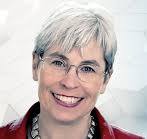Lack of quantum talent in Canada threatens to slow progress on quantum computing: report
 The scarcity of quantum talent in Canada and around the world threatens to slow progress toward realizing a multi-billion-dollar global market in quantum computing, says a report by the Quantum Algorithms Institute (QAI).
The scarcity of quantum talent in Canada and around the world threatens to slow progress toward realizing a multi-billion-dollar global market in quantum computing, says a report by the Quantum Algorithms Institute (QAI).
 “The most striking feature of the quantum landscape – in Canada and around the world - is the paucity of quantum talent,” Louise Turner (photo at left), CEO of Surrey, B.C.-based QAI, said in a forward to the report. Turner co-authored the report with Yoan Mantha (photo at right), data analyst at QAI.
“The most striking feature of the quantum landscape – in Canada and around the world - is the paucity of quantum talent,” Louise Turner (photo at left), CEO of Surrey, B.C.-based QAI, said in a forward to the report. Turner co-authored the report with Yoan Mantha (photo at right), data analyst at QAI.
This lack of talent threatens to slow progress to achieving the US$45-billion to US$131- billion global market for quantum computing in 2040, identified by McKinsey Digital in its recent Quantum Technology Monitor, Turner said.
Canada’s commercial and academic quantum talent pools are an estimated 4,000 people – just 0.01 per cent of Canada’s 40 million population, according to the QAI’s report. “This is small, but not unlike the quantum workforce in other countries.”
Today’s US$670-billion market for semiconductors, which developed and grew over around 80 years, employs 2.3 million people in 2024, is growing at a rate of 100,000 people per year, and is challenged to find enough people to support its growth, the report says.
“It is difficult to see how a newly minted quantum industry will have enough skilled people to support a US$131-billion market (or even a US $45-billion market) over the next 16 years without significant changes in education, training and professional development programs for quantum in countries all around the world.”
Key findings of the QAI’s report include:
- Despite financial tightening, private equity investments in quantum startups still reached $1.71 billion in 2023. The second-largest private investment globally in 2023 – US$100 million – was made in Vancouver-based startup Photonic Inc. However, private investments in quantum companies appears to have peaked at US$2.35 billion in 2022.
- Canada is punching above its weight in all aspects of quantum. Analysis of social media reporting shows that Canada is home to five per cent of the world's quantum talent pool, although Canada represents only 0.5 per cent of the world's population. Canadian researchers ranked 10th most prolific in the world in 2023, authoring 1,000 of the 75,000 quantum computing research papers published on arXiv.
The QAI’s researchers estimate that there are approximately 1,700 people in Canada’s commercial quantum workforce, plus at least 166 quantum researchers in Canada's post-secondary sector in addition to researchers in private research institutes and Master’s and Bachelor’s degree candidates – giving an estimated quantum talent base of no more than 4,000 people in Canada.
However, a “quantum research brain drain” identified last year remains, the report notes. More researchers were leaving than were coming to Canada, with the U.S. being the most common destination for outgoing quantum experts.
With talent shortages in established high tech sectors and international competition for highly qualified personnel in artificial intelligence and other deep tech fields, the nascent quantum sector will require innovation in education, training and workforce development to reach its full potential, the report says.
- Canada has a vibrant quantum business sector with quantum computing and software companies such as D-Wave, Xanadu, Anyon, Photonic, 1QBit, Good Chemistry and Nord Quantique leading internationally on commercialization, scientific advances and development of market-ready quantum solutions.
- Canada's 47-plus domestic quantum companies, based on the QAI’s estimates, are closely linked to Canadian universities and are mostly small Canadian controlled private companies.
Number of Canadians owning quantum-tech related patents has declined
Canadians own 14 per cent of all quantum technology-related patents filed in Canada, the report says. “The flurry of patent filings in Canada since 2015 points to quantum technologies transitioning out of research labs and into companies and reflects the increasing pace of international competition to deliver scalable, fault tolerant quantum computing.”
However, the report points out that until 2014, Canadian owners represented more than half of all patent applications filed in Canada.
After 2014, American corporations began filing applications en masse, reflecting a transition of the quantum market to a more commercial focus in 2014-2015. “Industry and corporate patents indicate major players are staking out business niches.”
The U.S. represents 61 per cent of all granted quantum technology-related patents, while the second-highest region, Europe, represents 17 per cent of patents.
The report notes that accurate data on Canada’s quantum labour market remains scarce due to the sector's infancy and the lack of national data collection benchmarks. Internationally, workforce data is similarly elusive, although available information suggests that the global talent pool for quantum is proportionately similar to or smaller than that in Canada.
For example, the list of companies provided by Innovation, Science and Economic Development Canada (ISED) to Statistics Canada comprises 75 Canadian quantum companies that ISED is aware of working in computing, communications and sensors.
This list includes companies making hardware components (chips, photonics, lasers, etc.), cryogenic equipment, software, software simulators, networking equipment, quantum sensing products or services, cryptographic solutions, and quantum computers.
Sixty per cent of the companies on ISED’s list were making $750,000 or less in revenues in 2021. From 2017 to 2021, revenues for Canada’s quantum companies increased from $103 million to $173 million, and the number of people employed in the sector grew from 888 in 2017 to 1,389 in 2020.
“Many companies in the sector are likely to be start-ups working on very low cash budgets, with employees earning low salaries but holding stock options in their companies,” the QAI’s report notes.
However, StatsCan data does not include multinational corporations that have quantum operations in Canada, such as IBM Canada or Honeywell, because StatsCan is unable to disaggregate their quantum statistics from their other domestic operations. Financial data from StatsCan is based on 68 companies and demographic data is based on 60 companies.
The Quantum Algorithms Institute has identified 47 domestic quantum companies that fall into three broad categories: quantum enabling hardware, or software, or quantum adjacent companies; post-quantum cryptography companies and companies using or building quantum hardware (including computers), software or tools.
The QAI said it is working to build an accurate picture of Canada's quantum ecosystem and its status in the world.
Distinct academic “hot spots” exist for quantum in Canada
Available data show distinct academic “hot spots” for quantum in Canada, the report says. Ontario, Quebec, and British Columbia represent most research being done in quantum technology fields.
A survey by national consortium Quantum Industry Canada found its member companies are headquartered across Canada, with 49 per cent based in Ontario, 24 per cent in Quebec, 12 per cent in B.C., and nine per cent in Alberta.
Quantum Industry Canada is continuously adding new members, including – this month alone – four companies from the Waterloo region in Ontario and six new Quebec-based members and affiliates, including DistrQ, the Quantum Innovation Zone of Sherbrooke, and Québec Quantique in Montreal.
Universities with the most researchers in the quantum fields are University of Waterloo, University of Toronto, University of Sherbrooke, and University of British Columbia, with some notable outliers, including the University of Ottawa, Ecole de Technologie Superieure, and McGill University, each of which have authors with more than 50 publications in the last year, according to the QAI’s report.
When it comes to investment, McKinsey Digital’s Quantum Technology Monitor, published in April 2024, lists 28 national quantum initiatives receiving more than US$42 billion of public money.
In April 2024, US-based quantum computing company PsiQuantum announced an investment of US$620 million from the Governments of Australia and Queensland for PsiQuantum to build a quantum computer in Brisbane, Australia.
Many companies developing quantum computers today are still resolving scientific challenges (such as noise, qubit fidelity, scalability and error correction) even as they have already attracted significant private and public investments. A commercially viable quantum computer must resolve these problems, the QAI’s report says.
In April 2024, Microsoft and Quantinuum announced a technological improvement to deliver “reliable logical qubits that reduce circuit error rates by 800 times.”
In December 2023, QuEra Computing Inc. and its academic partners at Harvard University, Massachusetts Institute of Technology, the University of Maryland and the U.S.’s National Institute for Standards and Technology announced a technological breakthrough, demonstrating a mechanism to run calculations on a 48-qubit computer using full error correction. “This was a significant scientific win and step towards QuEra’s delivery of a fault tolerant quantum computer.”
Earlier this month, Photonic announced a "significant milestone" on the path to commercially relevant quantum systems. While many existing quantum architectures achieve entanglement within modules, Photonic demonstrated entanglement between modules. The breakthrough provides a unique solution to one of the primary challenges on the road to large-scale quantum adoption – scalable entanglement distribution. (See brief in "Research, Tech News & Collaborations section in June 5 Short Report).
Says the QAI’s report: “Advances in science and engineering are being made in companies around the world, bringing the prospect of a scalable, fault tolerant quantum computer closer – moving from a 20-year science project to a 5-year engineering project.”
R$
Events For Leaders in
Science, Tech, Innovation, and Policy
Discuss and learn from those in the know at our virtual and in-person events.
See Upcoming Events
You have 0 free articles remaining.
Don't miss out - start your free trial today.
Start your FREE trial Already a member? Log in
By using this website, you agree to our use of cookies. We use cookies to provide you with a great experience and to help our website run effectively in accordance with our Privacy Policy and Terms of Service.




